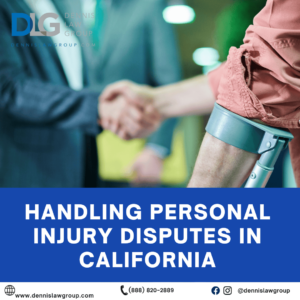Personal injury claims can be complex and emotionally taxing experiences. In California, understanding the ins and outs of this legal terrain is crucial when faced with an unfortunate accident. This comprehensive guide will walk you through the various aspects of handling personal injury disputes in California, equipping you with the knowledge to navigate these challenging situations.

I. California Personal Injury Laws: The Foundation
California has a specific set of laws that governs personal injury claims. Read on for more.
A. Definition and Basics
At its core, personal injury law in California revolves around tort law, which pertains to civil wrongs and injuries caused by negligence or intent. This legal framework protects individuals who have suffered physical, emotional, or financial harm due to another party’s actions.
B. Key Concepts in California Personal Injury Law
Navigating personal injury law in California involves understanding several critical concepts:
- Negligence: California law defines negligence as the failure to act with the level of care that a reasonable person would exhibit in a similar situation. It forms the basis for many personal injury claims.
- Duty of Care: All individuals in California have a legal obligation to avoid causing harm to others. This responsibility varies depending on the circumstances and relationships, such as a driver’s duty to obey traffic laws or a property owner’s responsibility to maintain safe premises.
- Breach of Duty: When someone fails to fulfill their duty of care, and their actions lead to harm, they are said to have breached their duty. For example, if a store owner neglects to address a known hazard, resulting in an injury, they may be held liable.
- Causation: To succeed in a personal injury claim, the plaintiff must prove that the defendant’s breach of duty directly caused their injury. This is known as causation.
- Damages: Damages refer to the financial compensation sought by the injured party to cover their losses, including medical bills, lost wages, property damage, and non-economic damages like pain and suffering.
II. California Personal Injury Claims Process
Understanding California’s personal injury claims process is pivotal when you’ve been injured due to someone else’s negligence or intent.
A. Immediate Steps After an Accident
- Safety First: Ensure your safety and seek immediate medical attention if necessary. Your health should be your top priority.
- Document the Scene: Document the accident scene, gather witness information, and take photographs to preserve evidence.
- Consult with an Attorney: Consider consulting a personal injury attorney who can guide you on the subsequent steps.
B. Statute of Limitations in California
In California, personal injury claims typically have a two-year statute of limitations from the date of the injury. However, exceptions exist, such as for minors and cases of delayed discovery. It’s crucial to adhere to these timelines to protect your rights.
III. The Role of Personal Injury Attorneys in California
Personal injury attorneys are pivotal in helping you navigate the complexities of personal injury disputes in California. The right injury attorney may mean the difference between financial recovery and being stuck with mounting bills you must pay on your own.
A. Advocacy and Protection
From the outset, personal injury attorneys can assist you in:
- Gathering Evidence: They can collect crucial evidence to establish the other party’s negligence and liability, including witness interviews, police reports, and medical records.
- Negotiating with Insurance Companies: Experienced attorneys can arrange to seek a fair settlement.
- Taking the Case to Court: If necessary, your attorney can advocate on your behalf in court, presenting your case to a judge or jury to secure maximum compensation.
B. Contingency Fee Basis
Most personal injury attorneys in California work on a contingency fee basis, which means they only get paid if they win your case. This fee is typically a percentage of the compensation awarded.
IV. Common Types of Personal Injury Claims in California
Several types of personal injury claims commonly arise in California, each with unique considerations.
A. Car Accidents
Car accidents can range from minor fender benders to severe collisions. Post-accident procedures often involve negotiations with insurance companies to determine fault and appropriate compensation.
B. Slip and Fall Accidents
Slip and fall accidents can occur anywhere and typically fall under premises liability laws. Property owners may be held responsible if they fail to maintain a safe environment, such as not promptly addressing spills.
C. Truck Accidents
Truck accidents often result in significant damage and severe injuries due to the size and weight of commercial trucks. These cases can become complex, involving multiple parties, including truck drivers, trucking companies, and parts manufacturers.
VI. Conclusion: Empowering Yourself in Personal Injury Disputes
Understanding the fundamentals of handling personal injury disputes in California is not just for legal professionals—it’s essential knowledge for anyone seeking protection after an accident. When in doubt, consult an experienced personal injury attorney who can guide you through the process and advocate for your rights. Knowledge is power; in personal injury law, it can mean the difference between obtaining the compensation you deserve and leaving empty-handed.
In conclusion, whether you’ve been involved in a car accident, a slip and fall incident, or any other personal injury situation, being informed and seeking legal guidance can help you navigate the challenging path toward recovery and justice in California.
Free consultations are available with Our Personal Injury Lawyers in California
At Dennis Law Group, we know that finding the right personal injury lawyer for your claim is important to your success.
You can find out whether you have a valid case at no cost to you. That’s because we offer free consultations. To request a free consultation with our team, call (888) 820-2889.
